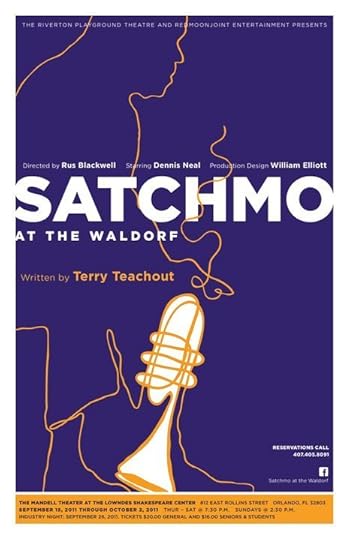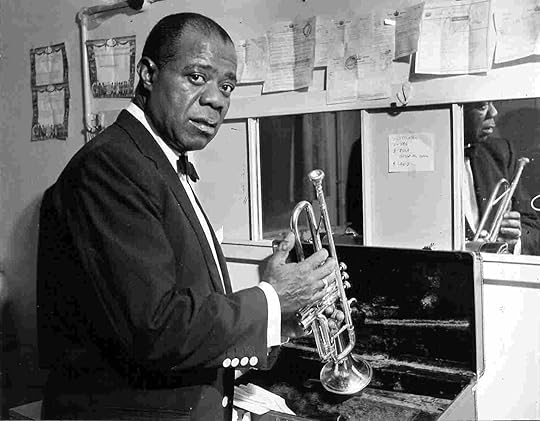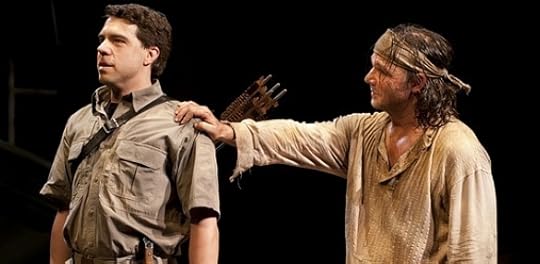Terry Teachout's Blog, page 211
September 11, 2011
TT: Almanac
"CRITIC, n. A person who boasts himself hard to please because nobody tries to please him."
Ambrose Bierce, The Devil's Dictionary
Ambrose Bierce, The Devil's Dictionary
Published on September 11, 2011 18:23
TT: A week with Satchmo (I)
Louis Armstrong and the All Stars perform "What a Wonderful World":
Published on September 11, 2011 18:23
TT: Countdown
I'm spending the week in Orlando, Florida, having flown down from New York last Saturday to attend the final rehearsals of
Satchmo at the Waldorf
, my first play, which opens on Thursday. I've spent fourteen of the past forty-eight hours sitting in a rehearsal room, watching
Dennis Neal
and
Rus Blackwell
, the star and director, pull the script off the page and put it on the stage.
 I'm staying in the same Rollins College-owned condo where I wrote the first draft of Satchmo at the Waldorf a year and a half ago during my first stint as a scholar-in-residence at the
Winter Park Institute
. Except for the (temporary) absence of Mrs. T, it felt like home as soon as I unlocked the front door. Indeed, I know my way around Winter Park so well that I drove to the grocery store two nights ago without benefit of GPS. No sooner did I roll my shopping cart into the store than I heard somebody calling out to me. "Hey, you're Terry Teachout!" he said. "How's the play going? I'll be there on opening night!" That felt good.
I'm staying in the same Rollins College-owned condo where I wrote the first draft of Satchmo at the Waldorf a year and a half ago during my first stint as a scholar-in-residence at the
Winter Park Institute
. Except for the (temporary) absence of Mrs. T, it felt like home as soon as I unlocked the front door. Indeed, I know my way around Winter Park so well that I drove to the grocery store two nights ago without benefit of GPS. No sooner did I roll my shopping cart into the store than I heard somebody calling out to me. "Hey, you're Terry Teachout!" he said. "How's the play going? I'll be there on opening night!" That felt good.
Rehearsing a play is a fascinating process, at once grueling and exhilarating—and, in my case, instructive. I already knew how good Dennis was, but Rus' directorial gifts have proved to be illuminating. He has an uncanny sense of the show's visual line, and I'm learning something new each time he tinkers with the blocking or gives Dennis a note about his performance.
Tomorrow we load the show into the theater and hang the set. I have to spend the whole morning writing Friday's Wall Street Journal column, but I'm going to head over and join the crew as soon as the column is filed. I don't want to miss any of the fun. Needless to say, it's going to be a busy week, but I'll do my best to blog between now and then about the process of putting the show on stage. (I'll also be be tweeting about the rehearsals at @terryteachout and in the "Terry's Twitters" module of the right-hand column.)
In the meantime, here's the author's note that will appear in the printed program:
Now, if you'll excuse me, I've got work to do….
* * *
To hear a radio interview in which Dennis Neal and Rus Blackwell talk about Satchmo at the Waldorf, go here .
 I'm staying in the same Rollins College-owned condo where I wrote the first draft of Satchmo at the Waldorf a year and a half ago during my first stint as a scholar-in-residence at the
Winter Park Institute
. Except for the (temporary) absence of Mrs. T, it felt like home as soon as I unlocked the front door. Indeed, I know my way around Winter Park so well that I drove to the grocery store two nights ago without benefit of GPS. No sooner did I roll my shopping cart into the store than I heard somebody calling out to me. "Hey, you're Terry Teachout!" he said. "How's the play going? I'll be there on opening night!" That felt good.
I'm staying in the same Rollins College-owned condo where I wrote the first draft of Satchmo at the Waldorf a year and a half ago during my first stint as a scholar-in-residence at the
Winter Park Institute
. Except for the (temporary) absence of Mrs. T, it felt like home as soon as I unlocked the front door. Indeed, I know my way around Winter Park so well that I drove to the grocery store two nights ago without benefit of GPS. No sooner did I roll my shopping cart into the store than I heard somebody calling out to me. "Hey, you're Terry Teachout!" he said. "How's the play going? I'll be there on opening night!" That felt good.Rehearsing a play is a fascinating process, at once grueling and exhilarating—and, in my case, instructive. I already knew how good Dennis was, but Rus' directorial gifts have proved to be illuminating. He has an uncanny sense of the show's visual line, and I'm learning something new each time he tinkers with the blocking or gives Dennis a note about his performance.
Tomorrow we load the show into the theater and hang the set. I have to spend the whole morning writing Friday's Wall Street Journal column, but I'm going to head over and join the crew as soon as the column is filed. I don't want to miss any of the fun. Needless to say, it's going to be a busy week, but I'll do my best to blog between now and then about the process of putting the show on stage. (I'll also be be tweeting about the rehearsals at @terryteachout and in the "Terry's Twitters" module of the right-hand column.)
In the meantime, here's the author's note that will appear in the printed program:
Louis Armstrong, the greatest jazz musician of the twentieth century, was a deeply happy, fundamentally optimistic man who was rarely seen without a smile—in public. But there was more to him than met the eye. Between 1947 and his death in 1971, Armstrong taped hundreds of after-hours conversations with his wife, friends, and colleagues in which he revealed a very different side of his personality. Some of these tapes are startlingly intimate, and many of them contain language that Armstrong never used on stage. I made use of the tapes in writing Pops: A Life of Louis Armstrong, my 2009 biography, and they later inspired me to write this play, in which Dennis Neal portrays both Armstrong and Joe Glaser, the trumpeter's longtime manager, who was as complex a character as Armstrong himself.
Satchmo at the Waldorf is a work of fiction, but it is based on and informed by the facts of both men's lives, and though I made up most of the dialogue, it closely resembles the way that Armstrong and Glaser talked in private.
Now, if you'll excuse me, I've got work to do….
* * *
To hear a radio interview in which Dennis Neal and Rus Blackwell talk about Satchmo at the Waldorf, go here .
Published on September 11, 2011 18:23
TT: Then and now
 Ten years ago I was visiting my mother in Smalltown, U.S.A. I had just delivered the manuscript of a book to my publisher and thought myself in need of a week's vacation.
This
is what I did instead.
Ten years ago I was visiting my mother in Smalltown, U.S.A. I had just delivered the manuscript of a book to my publisher and thought myself in need of a week's vacation.
This
is what I did instead.Today my life is unimaginably different, almost entirely for the better, and I'm grateful for my good fortune. Tomorrow I'll feel like talking about some of the reasons for that gratitude—but not now. This is a day to remember those whose lives were cut short by an act of foul, unmitigated evil, and those who sacrificed their own lives to save the lives of others on that terrible morning.
We should all be grateful that such courage is still to be found in the world. It was not in short supply on 9/11.
Published on September 11, 2011 05:00
TT: In memoriam
Leonard Bernstein and the Vienna Philharmonic perform the slow movement of Beethoven's "Eroica" Symphony:
Published on September 11, 2011 05:00
TT: Almanac
"Some men aren't looking for anything logical, like money. They can't be bought, bullied, reasoned, or negotiated with. Some men just want to watch the world burn."
Jonathan and Christopher Nolan, screenplay for The Dark Knight
Jonathan and Christopher Nolan, screenplay for The Dark Knight
Published on September 11, 2011 05:00
September 9, 2011
TT: First out of the box
 The Orlando Sentinel's Matt Palm has written an excellent preview piece about
Satchmo at the Waldorf
. Here's an excerpt:
The Orlando Sentinel's Matt Palm has written an excellent preview piece about
Satchmo at the Waldorf
. Here's an excerpt:Writer and arts critic Terry Teachout first encountered jazz great Louis Armstrong on "The Ed Sullivan Show" — thanks to his mother. It was the mid-1960s, and Armstrong was singing "Hello, Dolly!"
He recalls: "My mom called me in and said, 'This man won't live forever. I want you to remember him.'"
Teachout remembered, all right.
In 2009, he wrote Pops: A Life of Louis Armstrong, which was lauded by The Washington Post, The Economist and The New York Times Book Review as one of the best books of the year.
Now he has written a play about Armstrong, "Satchmo at the Waldorf," which will make its world premiere Thursday, Sept. 15, in Orlando. Noted local actor Dennis Neal will star in the one-man show as both Armstrong and his manager, Joe Glaser. Veteran director Rus Blackwell will direct….
Teachout, who has written the librettos for two operas, is excited to see the finished product, especially because it's his first play. He has critiqued hundreds of plays in his career — but now the shoe is on the other foot.
"I know what it's like to be on the other side of the machine gun," he says. "I hope it's made me a better critic. I think it has. I understand better how the process works."
He'll be in the opening-night audience.
Read the whole thing here .
Published on September 09, 2011 14:43
TT: To forgive, divine
In today's Wall Street Journal drama column, the last of my reports on my recent summer travels, I review American Players Theatre's productions of
The Cure at Troy
and
The Tempest
. Here's an excerpt.
* * *
Professional productions of the Greek tragedies seem to be growing less common in America—the last time I reviewed one was in 2008—and so American Players Theatre's revival of "The Cure at Troy," Seamus Heaney's adaptation of Sophocles' "Philoctetes," is of interest for that reason alone. But APT's staging, directed by David Frank, the company's artistic director, is no curiosity. It is, in fact, an overwhelming theatrical experience...
"Philoctetes," in which Sophocles dramatized the myth of the wounded Greek warrior (David Daniel) who was deserted by Odysseus (Jonathan Smoots) and his comrades, was largely forgotten save by classicists when Mr. Heaney published his English-language adaptation in 1991, four years before he won the Nobel Prize. "The Cure at Troy" is a masterly piece of versification, at once unpretentious in diction and elevated in tone. Without distorting the play's meaning, Mr. Heaney has subtly emphasized its continuing relevance, placing lines in the mouths of the chorus that liken the furious Philoctetes' self-consuming desire for revenge to the irredentist madness of Northern Ireland, the land of the poet's birth…
 Three of the cast members are part of APT's resident ensemble, and they give performances so compelling that you'll want to hold your breath each time they speak. Mr. Daniel's Philoctetes is a coolly urbane gentleman-warrior whom pain has reduced to a shrieking shadow of himself. Mr. Smoots' Odysseus is a rich-voiced cynic who is quick to heed the reassuring call of expediency. And Sarah Day, the leader of the three-woman chorus, narrates the unfolding tragedy with the world-weary wisdom of one who knows in her bones that understanding and forgiveness are not the same thing….
Three of the cast members are part of APT's resident ensemble, and they give performances so compelling that you'll want to hold your breath each time they speak. Mr. Daniel's Philoctetes is a coolly urbane gentleman-warrior whom pain has reduced to a shrieking shadow of himself. Mr. Smoots' Odysseus is a rich-voiced cynic who is quick to heed the reassuring call of expediency. And Sarah Day, the leader of the three-woman chorus, narrates the unfolding tragedy with the world-weary wisdom of one who knows in her bones that understanding and forgiveness are not the same thing….
More often than not, incidental music is exactly that, a gloss on a theatrical production that heightens the atmosphere without calling attention to itself. Once in a while, though, a composer makes a uniquely distinctive contribution to a first-rate show, and that's what Joshua Schmidt has done for James Bohnen's marvelous outdoor staging of "The Tempest." Mr. Schmidt, who is best known for his music for "A Minister's Wife" and "Adding Machine," has written a score full of delicate, slow-shifting chords that waft through the night air like wispy clouds in a soft breeze, dovetailing them with the natural sounds of the woods that surround APT's Up-the-Hill Theatre.
Part of what makes this production of "The Tempest" so striking is the contrast between Mr. Schmidt's magical music and the bluff, deliberately prosy acting of Kenneth Albers as Prospero. Nowadays most actors play Prospero with an elegiac touch, but Mr. Albers (who is also a director of note) has chosen instead to underline the anger that Shakespeare had in mind when he described the old sorcerer as "composed of harshness." This makes it all the more poignant when the once-vengeful Prospero redeems himself at play's end by choosing mercy over justice….
* * *
Read the whole thing here .
* * *
Professional productions of the Greek tragedies seem to be growing less common in America—the last time I reviewed one was in 2008—and so American Players Theatre's revival of "The Cure at Troy," Seamus Heaney's adaptation of Sophocles' "Philoctetes," is of interest for that reason alone. But APT's staging, directed by David Frank, the company's artistic director, is no curiosity. It is, in fact, an overwhelming theatrical experience...
"Philoctetes," in which Sophocles dramatized the myth of the wounded Greek warrior (David Daniel) who was deserted by Odysseus (Jonathan Smoots) and his comrades, was largely forgotten save by classicists when Mr. Heaney published his English-language adaptation in 1991, four years before he won the Nobel Prize. "The Cure at Troy" is a masterly piece of versification, at once unpretentious in diction and elevated in tone. Without distorting the play's meaning, Mr. Heaney has subtly emphasized its continuing relevance, placing lines in the mouths of the chorus that liken the furious Philoctetes' self-consuming desire for revenge to the irredentist madness of Northern Ireland, the land of the poet's birth…
 Three of the cast members are part of APT's resident ensemble, and they give performances so compelling that you'll want to hold your breath each time they speak. Mr. Daniel's Philoctetes is a coolly urbane gentleman-warrior whom pain has reduced to a shrieking shadow of himself. Mr. Smoots' Odysseus is a rich-voiced cynic who is quick to heed the reassuring call of expediency. And Sarah Day, the leader of the three-woman chorus, narrates the unfolding tragedy with the world-weary wisdom of one who knows in her bones that understanding and forgiveness are not the same thing….
Three of the cast members are part of APT's resident ensemble, and they give performances so compelling that you'll want to hold your breath each time they speak. Mr. Daniel's Philoctetes is a coolly urbane gentleman-warrior whom pain has reduced to a shrieking shadow of himself. Mr. Smoots' Odysseus is a rich-voiced cynic who is quick to heed the reassuring call of expediency. And Sarah Day, the leader of the three-woman chorus, narrates the unfolding tragedy with the world-weary wisdom of one who knows in her bones that understanding and forgiveness are not the same thing….More often than not, incidental music is exactly that, a gloss on a theatrical production that heightens the atmosphere without calling attention to itself. Once in a while, though, a composer makes a uniquely distinctive contribution to a first-rate show, and that's what Joshua Schmidt has done for James Bohnen's marvelous outdoor staging of "The Tempest." Mr. Schmidt, who is best known for his music for "A Minister's Wife" and "Adding Machine," has written a score full of delicate, slow-shifting chords that waft through the night air like wispy clouds in a soft breeze, dovetailing them with the natural sounds of the woods that surround APT's Up-the-Hill Theatre.
Part of what makes this production of "The Tempest" so striking is the contrast between Mr. Schmidt's magical music and the bluff, deliberately prosy acting of Kenneth Albers as Prospero. Nowadays most actors play Prospero with an elegiac touch, but Mr. Albers (who is also a director of note) has chosen instead to underline the anger that Shakespeare had in mind when he described the old sorcerer as "composed of harshness." This makes it all the more poignant when the once-vengeful Prospero redeems himself at play's end by choosing mercy over justice….
* * *
Read the whole thing here .
Published on September 09, 2011 05:00
TT: Almanac
"Disillusionment in living is finding that no one can really ever be agreeing with you completely in anything."
Gertrude Stein, The Making of Americans
Gertrude Stein, The Making of Americans
Published on September 09, 2011 05:00
September 7, 2011
TT: Almanac
"Everybody knows if you are too careful you are so occupied in being careful that you are sure to stumble over something."
Gertrude Stein, Everybody's Autobiography
Gertrude Stein, Everybody's Autobiography
Published on September 07, 2011 20:03
Terry Teachout's Blog
- Terry Teachout's profile
- 45 followers
Terry Teachout isn't a Goodreads Author
(yet),
but they
do have a blog,
so here are some recent posts imported from
their feed.



